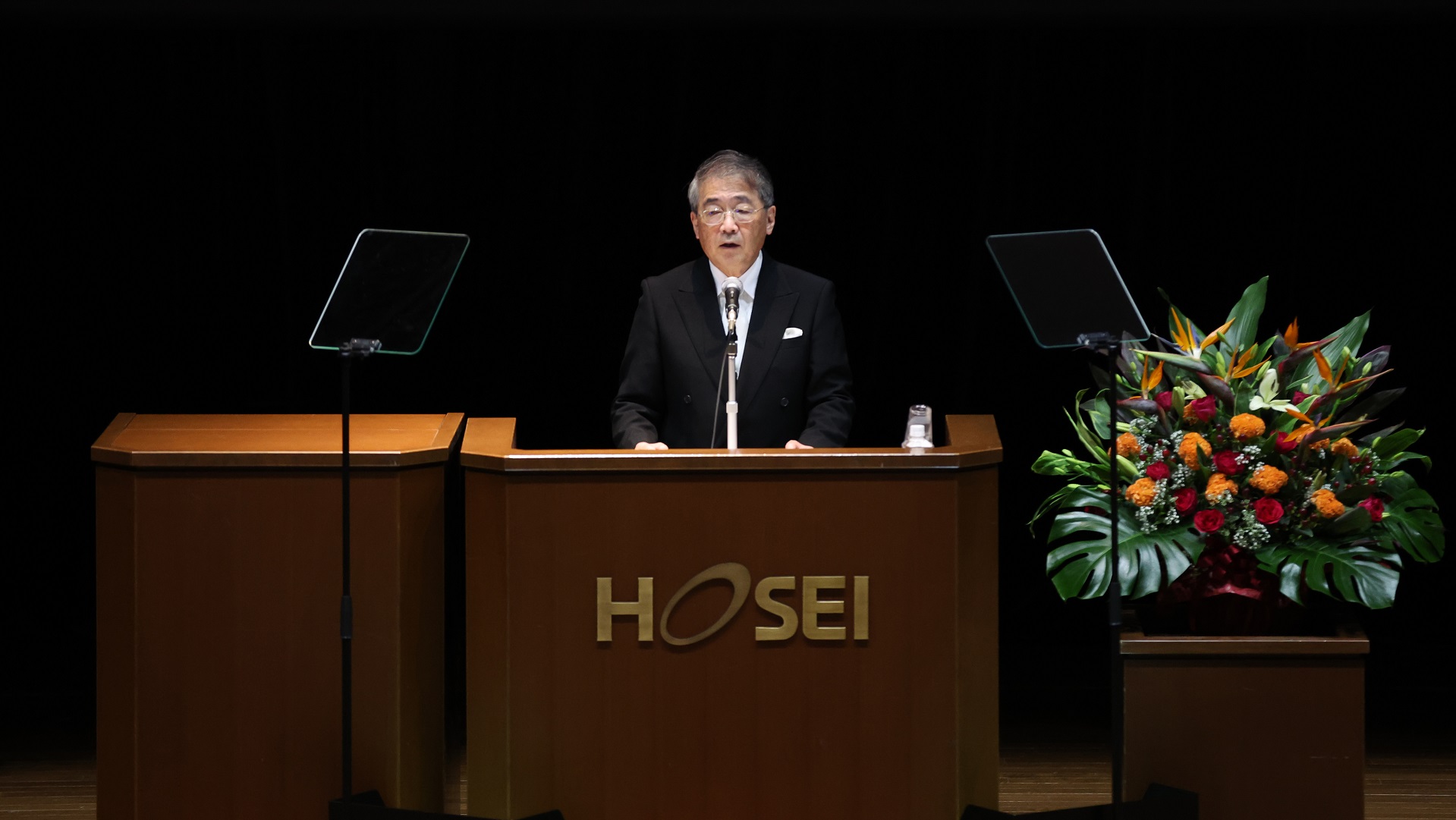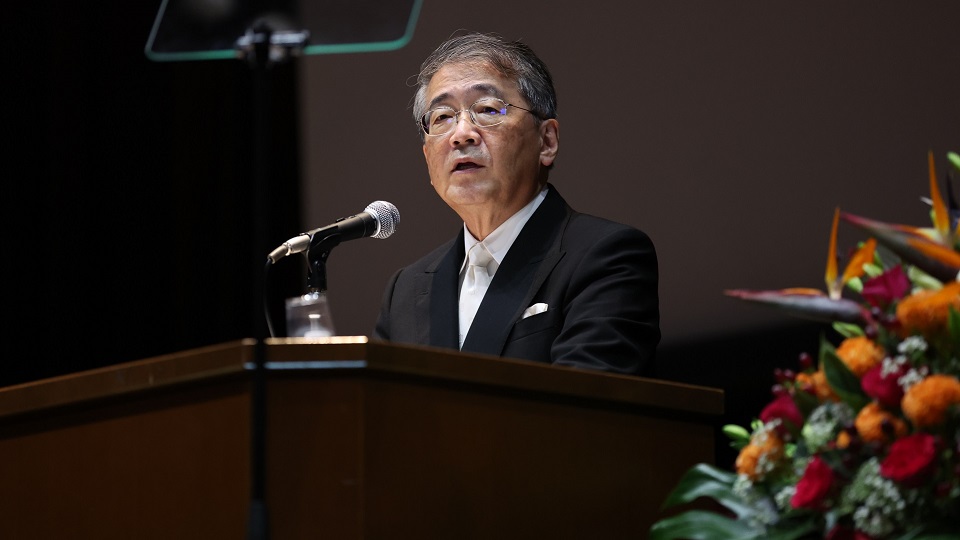News & Event
President’s Address for Entrance Ceremony, Autumn 2023
Congratulations to all the new students. Welcome to Hosei University. On behalf of the university, I want to welcome you all warmly. I also want to offer my congratulations to all your families.
You are about to start your studies here at Hosei University after experiencing more than three and a half years of living through the COVID-19 pandemic and the ending of the pandemic. The term “pandemic” means a worldwide outbreak of an infectious disease, but you must have experienced for yourselves that the severity of the epidemic and the response of schools and society to the situation were not uniform. You must have noticed that responses varied significantly from place to place and from time to time. I imagine that many of you felt that it was harder to make decisions and change your behavior when things were gradually returning to normal compared to earlier, when you had to respond rapidly to critical situations. When an emergency situation arose, the message conveyed to people was, “Please restrict your actions in this way.” This left individuals with little margin to make their own decisions. Most people had never experienced such restrictions. Although they probably felt unhappy at losing some freedom, everyone was in the same boat.

However, the restrictions on behavior are gradually relaxed, and eventually people are entrusted to decide for themselves what to do about a variety of behaviors. As they look around to see how other people act, they are faced with choosing from a certain range of options. The question is, “do you want to minimize the restrictions on your behavior?” or “would you rather minimize the risk of infection while accepting some restrictions?” People with a clear internal principle or strategy are able to make their own free decisions without much hesitation. Those who want to quickly return to pre-pandemic normal behavior as far as possible choose to live with minimal restrictions, by going out, attending face-to-face classes, traveling, and removing their masks. On the other hand, those who take the path of maximum caution decide to continue going out only when it is really essential, to take as many online classes as possible, which are still offered in about 10% of subjects this year, and to continue wearing masks. Both approaches are acceptable. And in both cases, people are living by their own choices.
In reality, however, most people fall somewhere between these two extremes in their choices. It seems that people decided between living with fewer restrictions or with a lower risk of infection, always taking into consideration the people around them. In other words, some people opted to observe a little bit fewer restrictions than the average, while other people rather prioritized a lower risk of infection. As a result, the general trend in behavior changes little by little, and so the judgments of individuals also change little by little. In a situation like this, there is nobody telling you what to do, but at the same time, you don’t make your own judgments without considering the situation around you. In other words, you are certainly allowed to make your own decisions, but you do not feel totally free. You are pressed to make your own judgments, taking various things into consideration, while feeling some degree of restriction, even though nobody is ordering you to do anything. Someone might feel, “To be honest, I wanted to change my behavior a little sooner, but I felt pressured to go along with what people around me were doing,” or conversely, “I changed my behavior to follow what people around me were doing, even though I didn’t want to change it yet.” So, rather than making decisions freely, they chose their actions based on their consideration of the surrounding situation, sometimes unwillingly. I believe that many people had experiences like these.
By the way, I want to mention the Hosei University Charter. Its title is “Practical Wisdom for Freedom.” Universities are subjected to various requests and demands from different sectors of society. When we are asked to do something that we are reluctant to do, we can’t just reject the request. Just as no individual can live alone without any connections to society, a university operates as part of society; it cannot function independently without connections to society. A university has a philosophy that defines what kind of institution it wants to be, and that philosophy also has something to do with the role it wants to play in society or the contribution it wants to make to society. For Hosei University to continue operating in accordance with its philosophy, it needs to strike a balance. On one hand, it cannot completely ignore the demands from society; on the other, it cannot respond to every demand and lose sight of its principles and values. Therefore, for Hosei University to seek ideal education and research in a creative manner and fulfill its social responsibilities, together with all the people gathered at the university, without losing sight of its starting point and direction, we thought that it is important to define what we want Hosei University to be in writing, so that we have a reference to check our activities against. This is the purpose of the Hosei University Charter, which is titled “Practical Wisdom for Freedom.”
As I explained earlier, it is quite difficult to experience “freedom” in situations in which you need to make your own decisions while taking into consideration the circumstances around you. However, as long as we live in a society, we cannot completely ignore our surroundings and just continue pursuing our own wishes exclusively. The 143-year history of Hosei University was also built up in the context of many social conditions and constraints, by focusing on what we want to be and not losing sight of our starting point and direction. To remain free, we need wisdom. That wisdom is more than just knowledge or philosophy; it has to be demonstrated in practical action. And it is not something that remains effective forever once it is acquired. This essential wisdom is something that can only be refined little by little, through repeated judgments and struggles over one’s own actions.
As you are entering Hosei University, in September 2023, I want you to keep in mind this feeling and idea about the need to dynamically balance individual freedom with the circumstances and conditions of society. During your time here, please also keep in mind that Hosei University, where you are starting your student life, is a place for you to strive for “practical wisdom for freedom.” If you ever feel unsure about a decision, or if you feel unsatisfied with a decision that you have made, remember to share your concern with a friend or faculty member so that you can think it over together. You cannot acquire “practical wisdom for freedom” without struggling for it seriously on your own, but you cannot acquire it by thinking about everything alone either. For this reason, take full advantage of the people and resources that are available to you here at Hosei University.
This is a place where people of diverse values and interests from many different communities come together. Including faculty, staff, and even alumni, you will have a wealth of opportunities to communicate with people of all ages. There are people who grasp things from perspectives that you cannot envision, or who have ideas that emerge because they refer to knowledge that you didn’t know. However, you won’t experience deep interactions with such a diverse group of people just by spending time on the same campus. Deep exchanges will only happen if you proactively express your doubts and tangled thoughts to others and make the effort to exchange opinions. I hope that your student life will be filled with many rich encounters, friendships, and discoveries. Welcome to Hosei University!


